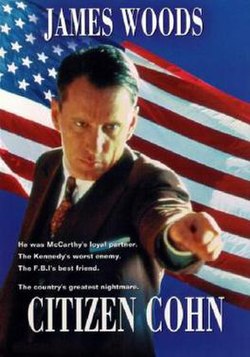| Year | Award | Category | Nominee(s) | Result | Ref. |
|---|
1992 | Peabody Awards | Home Box Office | Won | [2] |
1993 | American Cinema Editors Awards | Best Edited Television Special | Peter Zinner | Won | [3] |
| American Society of Cinematographers Awards | Outstanding Achievement in Cinematography in a Movie of the Week or Pilot | Paul Elliott | Nominated | [4] |
| Artios Awards | Best Casting for TV Movie of the Week | Mary Colquhoun | Won | [5] |
| CableACE Awards | Movie or Miniseries | Mark Rosenberg, Paula Weinstein,
Doro Bachrach, Frank Pierson, and
David Franzoni | Won | [6] |
| Actor in a Movie or Miniseries | James Woods | Nominated |
| Directing for a Movie or Miniseries | Frank Pierson | Won |
| Writing a Movie or Miniseries | David Franzoni | Nominated |
| Art Direction in a Dramatic Special or Series/Theatrical Special/Movie or Miniseries | Gary Kosko | Nominated |
Direction of Photography and/or Lighting Direction in a Dramatic or
Theatrical Special/Movie or Miniseries | Paul Elliott | Nominated |
| Editing a Dramatic Special or Series/Theatrical Special/Movie or Mini-Series | Peter Zinner | Nominated |
| Make-Up | Deborah La Mia Denaver and
Matthew W. Mungle | Nominated |
| Directors Guild of America Awards | Outstanding Directorial Achievement in Dramatic Specials | Frank Pierson | Nominated | [7] |
| Golden Globe Awards | Best Miniseries or Motion Picture Made for Television | Nominated | [8] |
| Best Actor in a Miniseries or Motion Picture Made for Television | James Woods | Nominated |
| Primetime Emmy Awards | Outstanding Made for Television Movie | Mark Rosenberg, Paula Weinstein,
Linda Gottlieb, and Doro Bachrach | Nominated | [9] |
| Outstanding Lead Actor in a Miniseries or a Special | James Woods | Nominated |
| Outstanding Supporting Actress in a Miniseries or a Special | Lee Grant | Nominated |
| Outstanding Individual Achievement in Directing for a Miniseries or a Special | Frank Pierson | Nominated |
| Outstanding Individual Achievement in Writing for a Miniseries or a Special | David Franzoni | Nominated |
| Outstanding Individual Achievement in Art Direction for a Miniseries or a Special | Stephen Marsh, Gary Kosko, and
Diana Stoughton | Nominated |
| Outstanding Individual Achievement in Casting for a Miniseries or a Special | Mary Colquhoun and Donna Belajac | Won |
| Outstanding Individual Achievement in Costume Design for a Miniseries or a Special | Jill M. Ohanneson | Nominated |
Outstanding Individual Achievement in Editing for a Miniseries or a Special –
Single Camera Production | Peter Zinner | Won |
| Outstanding Individual Achievement in Hairstyling for a Miniseries or a Special | Mona Orr | Nominated |
| Outstanding Individual Achievement in Makeup for a Miniseries or a Special | Lynne K. Eagan,
Matthew W. Mungle,
John E. Jackson, and
Deborah La Mia Denaver | Won |
| Outstanding Sound Mixing for a Drama Miniseries or a Special | John Pritchett, Dan Wallin,
Anna Behlmer, and Richard Portman | Nominated |

